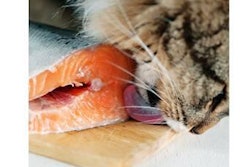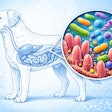The objective of this study was to examine adipokine and serotonin concentrations, and the gut microbiota in lean dogs and dogs with experimentally induced obesity. Fourteen healthy Beagle dogs were used in the study.
Seven Beagle dogs in the obese group were fed commercial food ad libitum over a period of six months to increase their weight, and seven Beagle dogs in lean group were fed a restricted amount of the same diet to maintain optimal body condition over the same period. Peripheral leptin, adiponectin, 5HT and cerebrospinal fluid levels were measured by ELISA. Fecal samples were collected in lean and obese groups six months after obesity was induced. Targeted pyrosequencing of the 16S rRNA gene was performed using a Genome Sequencer FLX plus system.
Leptin concentrations were higher in the obese group compared to those of the lean group. Adiponectin and 5-hydroytryptamine of cerebrospinal fluid concentrations were higher in the lean group than in the obese group. Analysis of the microbiome revealed that the diversity of the microbial community was lower in the obese group. Microbes from the phylum Firmicutes were the predominant group in the gut microbiota of lean dogs. However, bacteria from the phylum Proteobacteria were the predominant group in the gut microbiota of dogs in the obese group.
Decreased 5HT levels in obese group might increase the risk of obesity because of increased appetite. Microflora enriched with gram-negative might be related with chronic inflammation status in obese dogs.
Source: H.-J. Park et al., 2014. Association of Obesity with Serum Leptin, Adiponectin, and Serotonin and Gut Microflora in Beagle Dogs. JVIMonline, November 2014. doi: 10.1111/jvim.12455.















